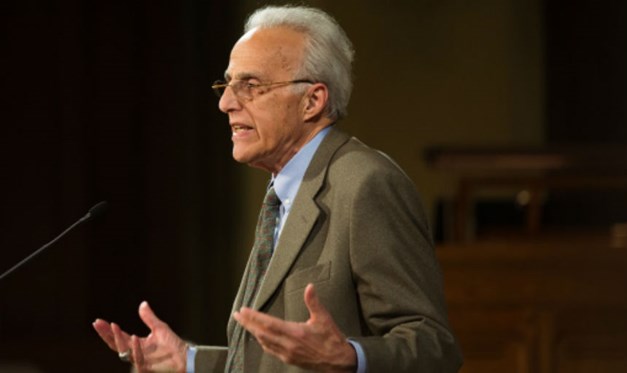Written by Bradley Bommarito
On Wednesday, Nov. 7, renowned Islam scholar Dr. John Esposito spoke to an eager crowd of students, faculty and community members about Muslim-American relations and harmful misinformation surrounding the Muslim community.
“This event is sponsored by the Donald L. Jordan Endowment for the Humanities, the Henry H. Fowler Program, and the Turk Pre-Law program. The main purpose is twofold. First, this lecture is an opportunity for our campus to learn more about Islam from polling data, and from a recognized scholar. Second, the purpose is to kick off the Middle East Studies Concentration,” said Dr. Melanie Trexler, assistant professor of religion at RC.
Esposito is the Professor of Religion and International Affairs and Islamic Studies at Georgetown University and Founding Director of the Prince Alwaleed bin Talal Center for Muslim-Christian Understanding, as well as the Bridge Initiative: Protecting Pluralism-Ending Islamophobia at Georgetown University. Esposito has served as a consultant to the U.S. Department of State, been a member of the Economic Forum’s Council of 100 Leaders, a Senior Scientist for the Gallup Center for Muslim Studies, and an ambassador for the UN Alliance of Civilizations. His more than 55 books include: What Everyone Needs to Know about Islam, Shariah: What Everyone Needs to Know, The Future of Islam, and Who Speaks for Islam? What a Billion Muslims Really Think (with Dalia Mogahed).
“The audience is likely to learn that media coverage of Islam is overwhelmingly negative and this coverage perpetuates Islamophobia. In comparison to media coverage that links Islam to terrorism, from polling data, we learn that American Muslims reject the use of violence against citizens. According to PEW, 76% of American Muslims denounce violence against citizens, in comparison with 59% of the U.S. population as a whole,” said Trexler.
Esposito discussed the discrimination that Muslims face every day in America and touched on how we can make out Muslim brothers and sisters feel welcomed and loved.
“There are numerous ways that RC students can show solidarity with Muslim peers, colleagues, and friends. First, share your lives with each other. Ask questions about a Muslim friend’s classes, their favorite music group, and what they enjoy doing in their free time. The same goes for people of all (or no) religion. Form friendships on shared interests and a shared focus on succeeding in your classes. In other words, get to know each other as people sharing a college experience. If you end up talking about religion, great! But, don’t feel you have to start there. Instead, find a common topic – like your shared love of Instagram – and start talking about it. Second, show up. Attend lectures, interfaith council events, international education programming, and multicultural affairs activities. Attending events like these will provide opportunities for people to interact with each other in new ways. Be sure to go to events you know nothing about to stretch your own horizons. By doing so, students can help to cultivate a more welcoming, comfortable environment for all of us who call Roanoke home’,” said Trexler.
Esposito’s lecture reminded us of the imminent danger of Islamophobia. Luckily, there are ways we can address such as social ills.
”
Confronting Islamophobia is a challenge we all face and requires us to speak up and take action when we can. In college, we have the unique time to learn how to listen to others’ experiences of racism, to read about the historical origins of xenophobia, and to sit in discomfort when we realize the ways in which we knowingly and unknowingly perpetuate racism. At RC, we also have a commitment to engaging in civil discourse, which means finding ways you can speak out against xenophobia. This can take many forms, including attending prayer vigils or interfaith services. Or, in environments where anti-Muslim sentiment is present, taking action could mean offering to sit next to a Muslim friend on public transportation or asking permission to walk with a Muslim student to her dorm so she is not alone. By putting our bodies alongside the bodies of those in our community, by listening to what people say they need and finding ways to stand with them to help as they fulfill that need, we recognize our shared humanity, even we do not share a faith,” said Trexler.




